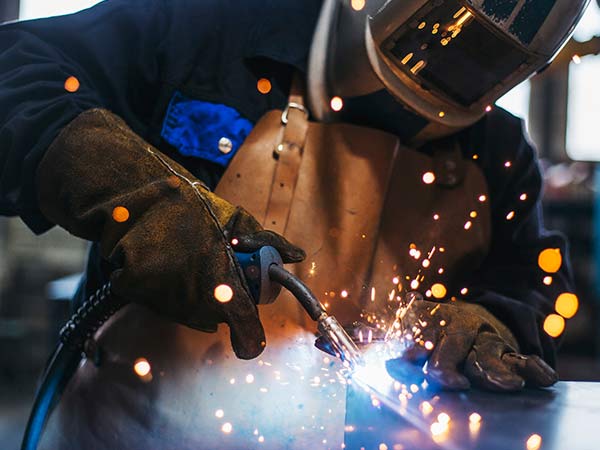What Are the 4 Types of Welding?
August 20, 2021 7:59 am
Welders play a role in most major industries in America, including aerospace, auto, and manufacturing. With over 50% of U.S. products requiring welding, this career field is always in demand. In fact, according to the U.S. Bureau of Labor and Statistics, welding is projected to see a 3% growth in the job market between 2019 and 2029. Welders with the most opportunities are often trained in several types of welding techniques.
While there are over 30 different welding types used for specific purposes in various industries, the most common types of welding techniques are MIG, TIG, Stick, and Flux-Cored welding.
The 4 Most Common Welding Types
-
MIG – Gas Metal Arc Welding (GMAW)
This type of welding process uses electricity to join and fuse pieces of metal. MIG is best used for small jobs in factories and workshops, like building furniture and constructing parts for boats. An easier technique to learn for people just starting out in the field, MIG welding is also commonly practiced by hobby-welders.
-
TIG – Gas Tungsten Arc Welding (GTAW)
TIG is a welding technique that produces clean lines and precise welds. Best used for aerospace manufacturing, auto repairs, and creating and building art, TIG welding allows you to control the temperature of the pool of metal on a weld in order to create a clean weld bead.
-
Stick – Shielded Metal Arc Welding (SMAW)
Stick welding is, perhaps, the most popular of all the welding types. It is portable and does not require gas, allowing welders to work outdoors. In order to perform stick welding, a welder must acquire a high level of skill. Construction is an example of an industry that is best served by stick welding.
-
Flux-Cored Arc Welding (FCAW)
Flux-cored is a type of welding that can be mastered by all different skill levels. This technique is extremely powerful and is able to penetrate larger and thicker pieces of metal. Flux-cored is most commonly used for shipbuilding, manufacturing, and repairs. Because it is a shielded welding process, it is more convenient to use outdoors since environmental conditions are not likely to affect its welding process.
Get Started in Your Welding Career
Whether you’re at a crossroads in your career or just getting started, if you enjoy working with your hands, possess a strong attention to detail, and are able to solve problems with a mathematical mindset, then you may want to consider a career in welding. Take the next step on this “hot” career path by signing up for a welding training course at The Manufacturing Alliance of Hillsborough County.
Cultivating the next generation of workers and leaders in the manufacturing sector, The Manufacturing Alliance of Hillsborough County offers advanced welding training programs that range from a 12-month Applied Welding Technologies course at Erwin Technical College and the Ybor City Training Center to a seven-week Welding and Fabrication course at Career Source Tampa Bay.
To learn more about our welding training programs and resources, contact The Manufacturing Alliance of Hillsborough County today.





